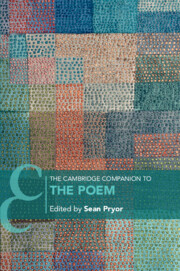Book contents
- The Cambridge Companion to the Poem
- The Cambridge Companion to the Poem
- Copyright page
- Contents
- Figures
- Contributors
- Acknowledgments
- Chronology
- Introduction
- Part I Ideas of the Poem
- 1 Singularity
- 2 Genre
- 3 Poem/Song
- 4 Poem/Novel
- 5 Poem/Concept
- 6 The Poem in Translation
- Part II Forms of the Poem
- Part III The Poem in the World
- Further Reading
- Index
- Cambridge Companions To …
6 - The Poem in Translation
from Part I - Ideas of the Poem
Published online by Cambridge University Press: 30 May 2024
- The Cambridge Companion to the Poem
- The Cambridge Companion to the Poem
- Copyright page
- Contents
- Figures
- Contributors
- Acknowledgments
- Chronology
- Introduction
- Part I Ideas of the Poem
- 1 Singularity
- 2 Genre
- 3 Poem/Song
- 4 Poem/Novel
- 5 Poem/Concept
- 6 The Poem in Translation
- Part II Forms of the Poem
- Part III The Poem in the World
- Further Reading
- Index
- Cambridge Companions To …
Summary
This chapter begins by arguing that debates about whether a poem can be translated reflect debates about the nature of the poem itself. Those who assert that poetry is untranslatable, for example, tend to believe that every poem is a unique event in a specific language. Conversely, those who assert the importance of translation tend to see poems as existing, and as having their meanings, only in relation to other poems or art forms. Considering examples from Roy Fisher, Friedrich Hölderlin, Vittorio Sereni, Jean-Joseph Rabéarivelo, César Vallejo, Donald Justice, Elizabeth Bishop, and Frank O’Hara, the chapter demonstrates that in practice, both these conceptual positions are essential. It explores how the practice of translation generates networks of mutually referential identities over time, and it suggests that, more broadly, the emergence of the abstraction known as “the poem” depends on its relation to such interconnections between poems, poets, and translations, ones that may be shaped by imitation, parody, homage, and adaptation.
Keywords
- Type
- Chapter
- Information
- The Cambridge Companion to the Poem , pp. 99 - 114Publisher: Cambridge University PressPrint publication year: 2024

